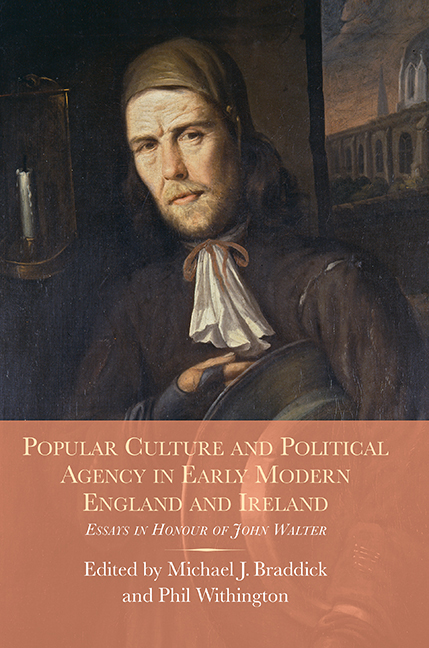 Popular Culture and Political Agency in Early Modern England and Ireland
Popular Culture and Political Agency in Early Modern England and Ireland Book contents
- Frontmatter
- Contents
- List of Illustrations
- List of Contributors
- Acknowledgements
- List of Abbreviations
- Introduction
- 1 John Walter and the social history of early modern England
- 2 Contrasting susceptibility to famine in early fourteenth- and late sixteenth-century England: the significance of late medieval rural social structural and village governmental changes
- 3 The politics of English political economy in the 1620s
- 4 Provision, household management and the moral authority of wives and mothers in early modern England
- 5 Popular senses of past time: dating events in the North Country, 1615–1631
- 6 Spectral lordship, popular memory and the boggart of Towneley Hall
- 7 Self-image and public image in the career of a Jacobean magistrate: Sir John Newdigate in the Court of Star Chamber
- 8 Gender, agency and religious change in early Stuart England
- 9 ‘A Standard which can never fail us’: the Golden Rule and the construction of a public transcript in early modern England
- 10 Religion, anti-popery and corruption
- 11 An ‘Aristotelian moment’: democracy in early modern England
- 12 John Lilburne and political agency in revolutionary England
- 13 An Irish Protestation? Oaths and the Confederation of Kilkenny
- 14 ‘Whereat his wife tooke great greef & died’: dying of sorrow and killing in anger in seventeenth-century Ireland
- Bibliography for John Walter
- Index
- Tabula Gratulatoria
- Miscellaneous Endmatter
6 - Spectral lordship, popular memory and the boggart of Towneley Hall
Published online by Cambridge University Press: 09 May 2017
- Frontmatter
- Contents
- List of Illustrations
- List of Contributors
- Acknowledgements
- List of Abbreviations
- Introduction
- 1 John Walter and the social history of early modern England
- 2 Contrasting susceptibility to famine in early fourteenth- and late sixteenth-century England: the significance of late medieval rural social structural and village governmental changes
- 3 The politics of English political economy in the 1620s
- 4 Provision, household management and the moral authority of wives and mothers in early modern England
- 5 Popular senses of past time: dating events in the North Country, 1615–1631
- 6 Spectral lordship, popular memory and the boggart of Towneley Hall
- 7 Self-image and public image in the career of a Jacobean magistrate: Sir John Newdigate in the Court of Star Chamber
- 8 Gender, agency and religious change in early Stuart England
- 9 ‘A Standard which can never fail us’: the Golden Rule and the construction of a public transcript in early modern England
- 10 Religion, anti-popery and corruption
- 11 An ‘Aristotelian moment’: democracy in early modern England
- 12 John Lilburne and political agency in revolutionary England
- 13 An Irish Protestation? Oaths and the Confederation of Kilkenny
- 14 ‘Whereat his wife tooke great greef & died’: dying of sorrow and killing in anger in seventeenth-century Ireland
- Bibliography for John Walter
- Index
- Tabula Gratulatoria
- Miscellaneous Endmatter
Summary
A spectre haunts Towneley Hall: the spectre of lordship. It takes the form of a boggart – that is, a supernatural presence – crying regret at having enclosed the nearby commons of Horelaw, Hollinhey and Hollinclough, bordering the Lancashire town of Burnley. This chapter begins with the identification of the sorrowful boggart and with what this might have to say about early modern social relations. The first part of the chapter tells the story of the enclosure of Horelaw, Hollinhey and Hollinclough in the early sixteenth century. It goes on to consider the subsequent contestation of that enclosure over the course of the sixteenth century. The second half of the chapter deals with the significance of curses and ghosts in the history of enclosure, and with the local memorialisation of these enclosures. It touches on a particularly chilling practice of anti-enclosure protest noted by John Walter: that of cursing enclosing lords to a ghostly afterlife, the incarnation of spectral lordship.
In 1818, the Lancashire antiquary T. D. Whitaker reported that
The malice and the superstition of the common people have doomed the spirit of some former and hitherto forgotten possessor of this estate [that is, Towneley Hall], to wander in restless and long unappeased solicitude, crying Lay out Lay out, Horelaw and Hollinhey Clough. Let it be understood that by lay out, is meant the reverse of taken in – to throw open, that is, or disappropriate.
Whitaker couldn't establish the identity of the encloser: ‘the offence has been remembered long after it had been redressed, and even when the name of the offending party was forgotten’. Whitaker was wrong: the name of the boggart was not forgotten. His inability to name the ghost of Towneley Hall was corrected a generation later by the Victorian antiquarian Thomas Turner, who identified the boggart as Sir John Towneley. Turner had this to say of Sir John:
He … obtained authority for enclosing a large portion of the waste land on Burnley Moors; much to the dissent of the peasantry, who, before, had free common for their cattle and geese on such lands. The Law, however, was stronger than the opposition of the poor; – but they revenged themselves by stating that, after death, his soul would never have rest until his successors had restored the land.
- Type
- Chapter
- Information
- Popular Culture and Political Agency in Early Modern England and IrelandEssays in Honour of John Walter, pp. 109 - 122Publisher: Boydell & BrewerPrint publication year: 2017


